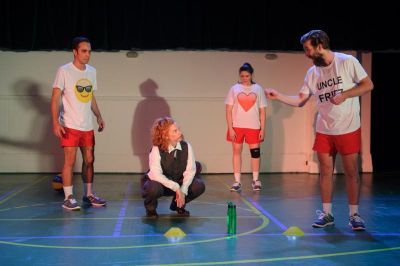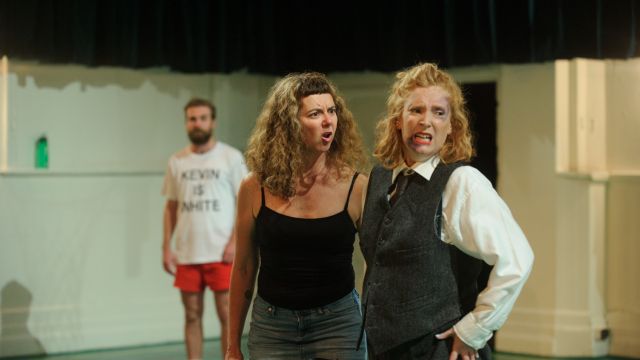Bright World
On 6 December 1938, some weeks after Kristallnacht in Germany and Austria, 78-year-old William Cooper led a delegation in Melbourne to the German Consulate. They presented a petition protesting at ‘the cruel persecution of the Jewish people by the Nazi government of Germany’. The consulate did not accept the petition. William Cooper was an Aboriginal man – a Yorta Yorta man – and his petition was on behalf of the Australian Aboriginal League, which he had founded. At this time indigenous people were not citizens, could not vote and were not even included in the census. Nevertheless, this singular petition was the only such protest made. Cooper recognised persecution when he saw it – and, unlike the rest of the world, did something about it.
Jewish playwright Elise Hearst’s grandparents fled Vienna after Kristallnacht, but she didn’t know about William Cooper until she was thirty. Meanwhile, Yorta Yorta playwright Andrea James, a descendent of Cooper, was invited by ARTHUR Theatre Company to work on his story. How the two women actually began their collaboration is not entirely clear from the program notes, but we do get a version of it in the play itself. Each of them plays a parodic version of themselves: the ever-apologetic, politically correct Jew and the prickly Aboriginal activist. When things get heated, neither is above trading some choice but entertaining – because accurate - insults.
 Ms Hearst and Ms James have made a play out of their apparently uncongenial histories and the burden of them. They had the link of William Cooper’s principled action – and the link of two peoples discriminated against, oppressed and murdered.
Ms Hearst and Ms James have made a play out of their apparently uncongenial histories and the burden of them. They had the link of William Cooper’s principled action – and the link of two peoples discriminated against, oppressed and murdered.
If that sounds like a pretext for anger, the play keeps itself nice. There is plenty of sugar on what could be a very bitter pill. There is more humour than horror or tears. They skilfully – or even brilliantly - juggle four time frames and sets of events – and make clear what those events meant to the people who were there. The storytelling touches lightly on Aboriginal dispossession and the struggle to get an education and any rights or recognition at all – as it does with notorious Viennese anti-Semitism and Ms Hearst’s grandparents’ flight from Nazi Austria. There’s a lot of ground to cover: Ms James’ story goes back to the 1870s, on the Mission at Maloga, where ‘Billy’ Cooper, already 14, shows an astonishing aptitude for learning – but must do it in secret. Across the world, in Vienna, anti-Semite thugs pick on a Jewish kid on his way to a music lesson... And the stories race up to the present, interspersed with the playwrights’ bickering about how to tell them. It’s an intricate and clever structural achievement.
As well as playing (versions of) themselves, Ms Hearst and Ms James play their ancestors and antecedents. Ms Hearst is the more confident performer – she seems to revel in the audience’s attention and in getting a laugh. She gets plenty. Ms James is more reticent, even to the point of swallowing her words – which is a pity because her words are witty and pointed. The two of them are ably aided by Shari Sebbens, Guy Simon and Kevin Kiernan-Molloy, all called upon to pay everything from the Cooper family and their teacher, Thomas Shadrach James, to Viennese thugs and Nazis. The energy and clarity these three bring to all their roles is admirable. Any confusion is obviated by their layers of T-shirts, helpfully labelled with the name or icon of whatever character they are in any particular scene.
 Romanie Harper paints the Theatreworks playing space rather puzzlingly (to me) as a basketball court – which appears not to have much to do with anything. Everything else, including Emma Valente’s lighting, is done with nicely judged, apparent simplicity. A chair, a hat, an orange light for a campfire. Paige Rattray’s direction is a major factor in the success of the show and its storytelling. Transitions are seamless – a great achievement given the complexity of the text – and the pace never flags.
Romanie Harper paints the Theatreworks playing space rather puzzlingly (to me) as a basketball court – which appears not to have much to do with anything. Everything else, including Emma Valente’s lighting, is done with nicely judged, apparent simplicity. A chair, a hat, an orange light for a campfire. Paige Rattray’s direction is a major factor in the success of the show and its storytelling. Transitions are seamless – a great achievement given the complexity of the text – and the pace never flags.
You might say that, given the dark and sensitive material, Bright World is simplistic and perhaps rather too calculatedly ‘feel good’. This show might cop it from Left and Right, but there was no doubt that the audience (or most of it) did feel good and did make the connections Ms James and Ms Hearst intend. And after the breakneck ride through two histories, the comic conflicts and jokes, the ending is suddenly still and quiet and moving. There are other ways to tell these stories, but this one is an ingenious answer to their challenges.
Michael Brindley
Photographer: Sarah Walker.
Subscribe to our E-Newsletter, buy our latest print edition or find a Performing Arts book at Book Nook.

